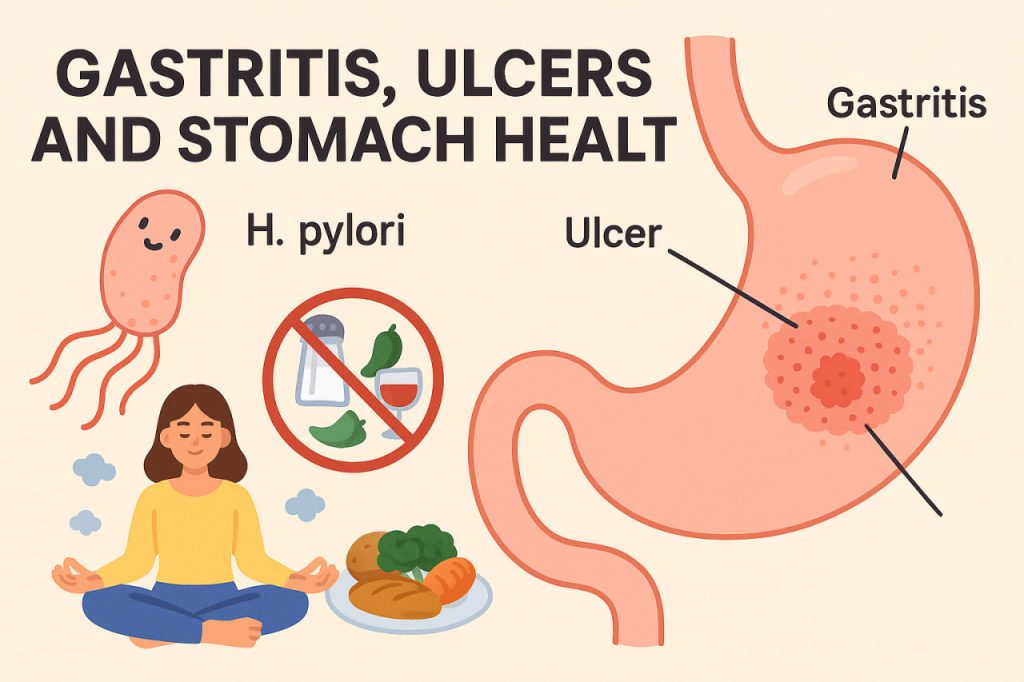Stomach discomfort, burning sensations, and digestion problems are common signs of gastritis or a stomach ulcer. These conditions affect the lining of the stomach and can worsen over time without proper care. Understanding how they develop and how to protect your stomach is essential for long-term digestive health.
What Is Gastritis?
Gastritis is the inflammation of the stomach lining. It may occur suddenly (acute) or develop gradually (chronic). The main causes include:
- Helicobacter pylori infection (a common stomach bacterium)
- Overuse of painkillers like ibuprofen or aspirin
- Alcohol or spicy food consumption
- Smoking
- Stress or autoimmune disorders
Common symptoms of gastritis:
- Burning or aching pain in the upper abdomen
- Nausea or vomiting
- Bloating or feeling full quickly
- Loss of appetite
In some cases, gastritis causes no symptoms and is only found during medical exams.
What Are Stomach Ulcers?
A stomach ulcer, or peptic ulcer, is a sore in the lining of the stomach or small intestine. Like gastritis, it is often caused by H. pylori infection or long-term use of NSAIDs (non-steroidal anti-inflammatory drugs).
Signs of a stomach ulcer may include:
- Burning stomach pain, especially between meals
- Pain relief after eating or taking antacids
- Nausea or vomiting
- Dark stools or signs of bleeding in severe cases
Unlike gastritis, ulcers involve visible damage to the stomach lining.
How Are These Conditions Diagnosed?
A healthcare provider may use:
- Physical examination and symptom check
- Breath or stool tests for H. pylori
- Endoscopy to view the stomach lining
- Blood tests to detect anemia (from internal bleeding)
Self-diagnosing is dangerous. Only a doctor can properly assess and treat these issues.
How to Support Stomach Health Naturally
While some cases require medical treatment, the following lifestyle habits can support stomach healing and reduce irritation:
- Eat smaller, balanced meals to avoid overwhelming your stomach
- Avoid fried, spicy, and acidic foods
- Limit caffeine
- Exclude alcohol
- Don’t smoke—it weakens the stomach lining
- Chew food slowly and eat in a calm setting
- Manage stress with meditation, walking, or breathing exercises
Herbal teas like chamomile or licorice root may soothe the stomach—but always consult a doctor before trying them.
When to See a Doctor
You should seek medical advice if you experience:
- Persistent or worsening abdominal pain
- Frequent nausea or vomiting
- Black or bloody stools
- Unexplained weight loss
- Loss of appetite
- Pain that wakes you at night
These could be signs of a more serious issue. Never ignore ongoing symptoms.
Glossary
- Gastritis – Inflammation of the stomach lining
- Ulcer – A sore or wound in the lining of the stomach or intestines
- Helicobacter pylori – A bacterium that can damage the stomach lining and cause ulcers
- NSAIDs – Medications that reduce pain but can irritate the stomach lining
- Endoscopy – A procedure using a small camera to view the stomach from inside


